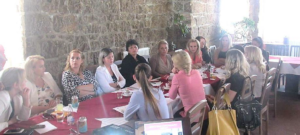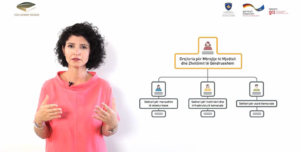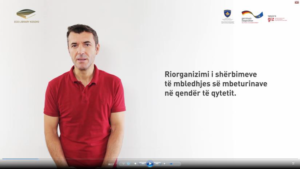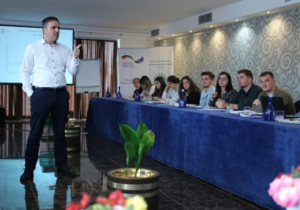CONTEXT
Municipalities in Kosovo face a huge challenge when it comes to providing essential services for their citizens and this is evident in the waste management sector. The country still lacks an organized integrated system of waste management. As it stands, waste is simply transported to dumping sites without any sorting, treatment or processing. Many rural areas lack waste disposal systems altogether and illegally accumulated waste is an ever-present problem. As of 2017 only an alarming 58% of households in Kosovo have access to waste collection services.
While the transition process for the state, its institutions and its regulatory framework towards a participatory and decentralized system of governance has begun, local authorities have yet to exercise their duty to steer the waste sector. The aim of the GIZ Sustainable Municipal Services (Waste Management) – SMS is to
strengthen the capacities of the municipalities, the government, and other relevant actors in the country to better equip them to provide efficient waste services to all citizens of Kosovo.
Although there is an overall aim to increase gender equality in the country, the waste sector is still predominantly male. Only very few women are employed in the sector, mostly holding administrative jobs. Companies claim that there is no willingness of women to work in the operation of waste services and up until now there have not been any specific employment policies to change the situation and encourage women to join the sector. While it has posed to be a challenge, the SMS project believes that the gender situation in the waste management sector in Kosovo, also in regard to future circular economy, requires attention. Together with local partners there are already success stories in gender integration in the sector, especially when it comes to capacity development.
HOLISTIC APPROACH TO GENDER INTEGRATION
Even though waste management at first seems to be a gender neutral sector, the GIZ SMS project together with local partners has found many opportunities where the gender perspective can be incorporated to benefit society as a whole. To begin, the team is aware of the importance of having baseline data in order to address and implement changes, and thus is very active in making sure we are continuously attaining and recording data that’s segregated by gender. Additionally, we have made it part of our daily work to request from partners, consultants, and NGOs to always include gender segregated data in their reporting. This has proven to be a success factor that has allowed the team to measure results and pinpoint the methods that have proven to be effective in order to continue or adjust the approaches.
One practical example that has been deemed successful is gender integration in the process of drafting Local Solid Waste Management Plans. In all 18 partner municipalities, we requested to include the Municipal Gender Focal Person in the Working Groups and ensured active participation in the in drafting of the plans. In addition to this, together with the active NGOs we organized women only consultation meetings in rural areas in order to better integrate the role of women in the plans. For most municipalities this was the first time drafting the plans and there has been positive feedback from the officials. We expect this type of participatory process will serve as a precedent for drafting or revising municipal plans to follow.
Similarly in the central level together with the Ministry of Environment and Spatial Planning we are in the process of revising the national strategy to ensure there is coherent coordination between national planning and local municipal waste management plans. In the working group, we are requesting to have the Gender Focal Person from the ministry who will ensure that Gender Responsive Budgeting is taking place as required by law. This will further reduce gender inequalities in the sector and promote gender-sensitive development policies.
To follow we will highlight three successful approaches in capacity building in the sector that have proven to be successful in integrating gender equality and raising awareness for its importance to our partners.
APPLYING THE GENDER LENS TO INNOVATIVE E-LEARNING MODULES
The project together with the partner Ministry of Environment and Spatial Planning has launched an online platform dedicated to knowledge sharing and capacity building in the waste management sector. A key feature of the website is the innovative E-learning videos, a first of its kind in the country, which will serve as a guide for waste management officials to implement their work. Throughout the process of developing the content and videos, special attention was paid to gender sensitivity. In script writing there was extra editing to assure that gender appropriate language and gender neutral pronouns were used. Throughout the process of developing the needed graphics, stereotypes of gender roles were avoided and collaboration between men and women was highlighted. For example, there is an even visualization of men and women in the graphics where decision-making structures are presented. Together with the ministry it was decided to have experts from both genders as speakers in the videos to break the norms and encourage women to enter the sector. As online learning is fairly new to the country, the development of the modules through the gender lens served as a practical example to our partners of how important it is to integrate gender mainstreaming through all activities and products.
ENCOURAGING YOUNG WOMEN TO ENTER A MALE DOMINATED FIELD
In order to increase knowledge and interest in the field, the SMS project together with the Kosovo Energy Efficiency Project (KEEP) organized a week long summer school dedicated to waste management and energy efficiency. In the call for interested participants, both young women and men from universities in the country were encouraged to apply and affirmative action was used in the selection criteria. Together with the implementing NGO we had a balanced number of participants with 17 young women and 13 young men qualify to attend the summer school. During the school special attention was directed towards encouraging collaboration between genders and equal opportunity was given for both women and men to present their ideas to the group. As most of the students were from engineering fields, the gender balance was acknowledged and commented on by the participants as something new and encouraging. Through this experience, in the near future we plan to work together with other donors to provide scholarships to women studying in the STEM fields with a special emphasis to topics treating environmental issues.
CERTIFICATION OF WOMEN IN THE WASTE SECTOR
As noted in the gender analysis for the project, women are underrepresented in the waste sector, with careers and decision-making positions being dominated by men. In tackling this, we continue to raise awareness and encourage mayors and Public Owned Company Directors to also appoint women in the waste units. To enhance capacities, the project together with the Kosovo Institute of Public Administration is developing standardized trainings to officially certify waste managers in the country. With this, explicit attention is given to ensure that both women and men participate in and benefit from the capacity building trainings so they both have the opportunity to meaningfully contribute in decision making processes and take on leadership roles in the waste management sector. Through good cooperation with the partners we are starting by introducing affirmative actions to ensure that a fraction of the trainers who participate and are certified through the Training of Trainers are women. Ultimately, the aim is to have 30% women certified in waste management who will take decision making roles in the near future.
GIZ Project Office Anton Çetta No. 1 10000 Pristina Republic of Kosovo

 GIZ Gender Website
GIZ Gender Website


